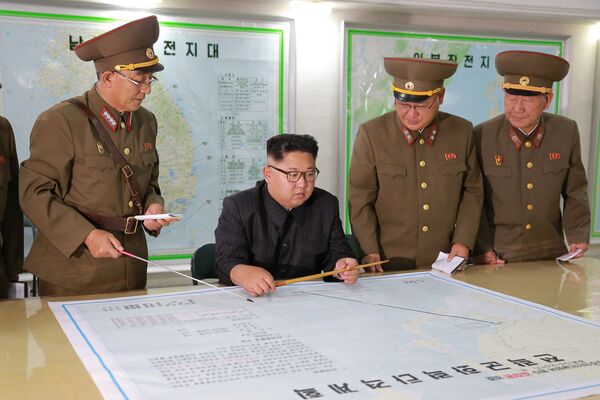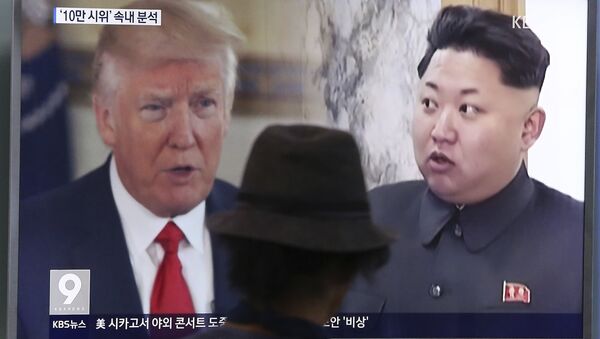To say the least, tensions between the US and North Korea, never less than frostily antagonistic since the 1950 commencement of the Korean War, have reached an incendiary nadir since the November 2016 presidential election.
Saber-rattling rhetoric on both sides has mutated into borderline direct threats of war, with Trump talking the military being "locked and loaded" to rain down "fire and fury like the world has never seen" on North Korea, and Pyongyang threatening to strike Guam if the US attempts to block its ballistic missile tests.
After many years of failure,countries are coming together to finally address the dangers posed by North Korea. We must be tough & decisive!
— Donald J. Trump (@realDonaldTrump) August 8, 2017
While many no doubt hope the ever-inflammatory verbal jousting between the two sides is mere posturing, which may be resolved by serious talks, time may not be on diplomacy's side, and while the world may not yet be on the brink of nuclear war, it does face a major crisis of historic proportions.
The US has repeatedly made clear that North Korea gaining Intercontinental Ballistic Missile capabilities would be "unacceptable" as it would pose a threat to some of its major cities, and the country nearing the goal would precipitate a "first strike" of some kind. If war were to erupt before North Korea even approached acquiring the ability to threaten the US mainland, the consequences for the region would likely be more devastating than any conflict the world has ever seen since World War Two.
Analysts suggest the conflict could produce hundreds of thousands of casualties in North and South Korea alike within mere weeks, although if other states were to become militarily involved —or indeed nuclear weapons were deployed — the picture would inevitably be far more catastrophic.
Why the UK Needs to be Thinking Now about a Possible Korean War @MChalmers_RUSI #NEWSBRIEF https://t.co/wGSshIuwIR
— RUSI (@RUSI_org) August 16, 2017
"What we do know is if war did begin, the President would be on the phone to 10 Downing Street within an hour asking for support. Russia and China would demand an immediate United Nations Security Council meeting. The world's media would be dominated by round-the-clock coverage of the evolving crisis. The British Prime Minister would then have only a few hours, at most, to make clear how they stood on what would be one of the most momentous strategic shocks of the post-Cold War era," RUSI write.
Such a moment would be a critical flash point for the UK, whatever decision the country's leaders then made would have a seismic impact on the UK's international standing and domestic politics alike. However, unlike similar "zero hours" the UK has previously faced, there would be virtually no time for consultation, discussion or deliberation before a position had to be taken — RUSI believes "the die would be cast on Day One." As a result, Whitehall must prepare now for a range of possible scenarios that could unfold.
Much would depend on how the war starts. North Korea, for example, might retaliate if the US shoots down a test missile fired anywhere in the remote vicinity of Guam — or Pyongang could justifiably interpret a massing of US forces on its border as the precursor to all-out invasion. Alternatively, the US may attack Pyongyang in a "preemptive strike" without official warning, or mandate from the UN.
No need to panic. It's like the Cuban missile crisis only with Trump & Kim instead of Kennedy & Khrushchev.
— Matthew Scott (@Barristerblog) August 8, 2017
Duck and cover. https://t.co/vJoZsdYDWd
— Jeffrey Lewis (@ArmsControlWonk) August 11, 2017
However a potential war begins, the UK would undoubtedly be involved — the only question is how. If North Korea was responsible for initiating a conflict, the UK may have little choice but to provide military and logistical support to their closest ally — as would the US other NATO allies (London and Paris are around the same distance from North Korea as Los Angeles, as an ICBM flies).
In such a scenario, Whitehall may draw some relief from having received no advance notice, and could justifiably wait for the conflict to develop — by hours, or days — before providing a military contribution of its own.
Conversely, if the conflict was perceived to have been US-initiated and/or provoked, RUSI believes it would be difficult to secure a parliamentary majority in favor of dispatching UK military assets to Korea — instead, the UK's contribution may have to be diplomatic, in conjunction with a wider international effort to broker negotiations between the parties, prevent escalation and bring the conflict to a rapid end.

Irrespective of what stance the government takes, RUSI imagines it won't be sustainable for long, which means there is all the more reason for Whitehall to conduct preparatory work now for what is "no longer an unthinkable scenario," and furthermore for the government to align itself with countries now urging the US not to employ "preventive strikes." The influential think tank quotes the Chilcot Report, the investigation in the UK's involvement in the Iraq war, which stated the UK's relationship with the US is strong enough to "bear the weight of honest disagreement."
"It does not require unconditional support where our interests or judgments differ…the lesson is all aspects of any intervention need to be calculated, debated and challenged with the utmost rigor," the report concluded.
RUSI is perhaps the first mainstream Western organization to publicly suggest war between the US and North Korea is potentially likely, although its call for the UK to serve a conciliatory role in such an eventuality may be surprising to some. Nonetheless, the think tank has previously adopted a highly dovish, sober perspective on UK military matters — in July, RUSI published a whitepaper that concluded UK defense capabilities, costing tens of billions annually, are vulnerable to low-cost, technology-rich weapons employed by other states, and the government should commit to research, innovation and adaptive technologies for genuine defensive purposes, rather than force projection, as a result.
New @RUSI_org report: Defence #Innovation & the UK: Responding to the Risks Identified by the US 3rd Offset Strategy https://t.co/JpmL8vfEu8
— RUSI (@RUSI_org) July 11, 2017
Most notably, it concluded the use of nuclear weapons by the UK was a Cold War "hangover" and "less appropriate and credible" — instead, other sources of deterrence and conflict avoidance should be explored and strengthened, and the UK military should shift its emphasis from force projection to protection of national assets and infrastructure. This would, RUSI suggested, mean the jettisoning of UK military capabilities and hardware that are unusable or susceptible to debilitating cyberattacks and the like.


